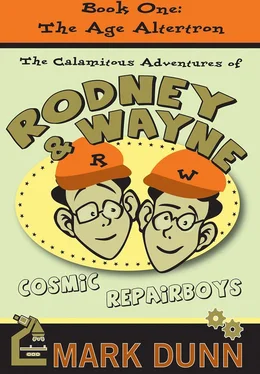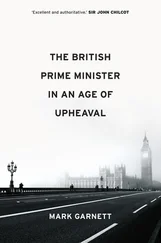Becky’s father, Mr. Craft, who sometimes came to the McCall home to watch boxing matches with Mr. McCall and Mr. Lipe and Principal Kelsey, once picked up the model of the Trylon and Perisphere and tossed it back and forth in his hands in a disrespectful way, and made a funny comment about it. He said that the real Trylon and Perisphere must have looked to people like a gigantic golf ball that had fallen off its gigantic golf tee. Mr. McCall was not amused. He stopped inviting Mr. Craft to the McCall home after that remark.
But this didn’t stop Mr. Craft from returning to the McCall home on this particular morning. Here he was standing in the den holding his baby-sized daughter Becky in his arms. Mr. and Mrs. Ragsdale were also present. Mr. Ragsdale, looking very upset, kept running his trembling hand over and over again through his thinning hair. (Yesterday Mr. Ragsdale had been totally bald but now he had some hair.) Mrs. Ragsdale was wringing her hands and pacing alongside her husband. There were other worried people in the room as well, each looking about eleven-and-a-half years younger, and each of whom had come to crowd themselves into the small room to find out what was to be done. They had followed Professor Johnson all the way from his house to the McCall residence, peppering him with questions along the way: “What has happened to my little boy? Where did my little girl go?” People often turned worriedly to the Professor when a new calamity struck the town, but this time they were even more worried than usual, for there was the serious matter of lost children to be concerned about.
Mr. Craft had come on behalf of one of the salesmen at his appliance store, a man named Armstrong, who had that morning gone into the room where his six-year-old girl Daisy and his fouryear-old boy Darvin slept, and found their beds empty. He was so upset that he went into the bathroom and climbed into the tub with all of his clothes on and would not get out.
Mr. Dean, the newspaper editor, had also come to the house. He wanted to hear the Professor’s opinion about what had happened so that he could put it in his paper. Mr. Dean had already written the first few lines of his article about the latest calamity and was waiting for the Professor’s comments so that he could finish it. In the article Mr. Dean planned to remind his readers that the most logical reason for the disappearance of Pitcherville’s youngest residents was sunspots, pure and simple. But he had an obligation to give other possibilities, even if those other possibilities pointed to a Pied Piper or bad milk. It is the duty of a journalist to give all sides — even the ones that make no sense.
“So what is your theory, Professor?” prodded Mr. Dean. He rudely waved his reporter’s pad in front of Professor Johnson’s face as if he expected the Professor to write the theory down himself.
Professor Johnson pushed the pad away. He was feeling uncomfortable, because he didn’t like being trapped in tight spaces with a lot of people. He didn’t ride elevators for this reason, and he never played games in which the object was to see how many people could fit into a broom closet or large crate.
“I do have a theory,” said the Professor in an uneven voice. “It is the same theory as the one which my assistants Rodney and Wayne have come up with. Rodney, my boy, why don’t you tell everyone our theory while I put my head out this window for a breath of air?”
Rodney explained to all the people in the room how he believed that eleven-and-a-half-years of instantaneous reverse aging had put those children under that age into a pre-existing state. And that was why they were nowhere to be found — for there were no bodies around for them to occupy.
“Then where are they?” sobbed Mrs. Ragsdale. “What has happened to them? Will I ever see my Petey again?”
Wayne stood up on the sofa, his legs bowing out like a baby’s and making him a little unsteady on his feet. Both he and Rodney were now wearing the baby jumpers Aunt Mildred had pulled out of the attic cedar chest. The jumpers had a pattern of little ducklings and goslings on them. Wayne placed one of his hands on his hip and raised the other into the air as Mighty Mike might have done when he was a super-hero infant.
“The Professor is working on the problem,” he said. “You can be assured that this problem will be corrected and all of your children will be returned to you. Isn’t that right, Professor?”
The Professor did not hear the question. His head was still outside the window and he was making a sucking noise, trying to draw more air into his lungs.
Mr. Craft stepped forward and addressed Rodney and Wayne: “How can you be so sure that we will get the children back?”
Neither Rodney nor Wayne knew how to respond, and the Professor wasn’t being very helpful. Before the boys could come up with an answer, the telephone in the kitchen rang. Aunt Mildred, who had been serving coffee to people, set down her coffeepot and went to answer it.
“You all must be patient,” said Becky from the envelope of her father’s arms. “The Professor is working very hard. Even harder than usual.”
“No he’s not,” said Mr. Dean, the newspaper editor. “He’s sticking his head out of the window.”
“Well, if there weren’t so many people in this room making things so difficult for him!” Rodney and Wayne had never seen their little friend so upset before. It was even more unusual to see her large baby eyes fired with anger and her rosy cheeks even rosier than they had been earlier. It was usually Becky’s nature to be cheerful or at the very least, politely pleasant. But Rodney and Wayne could certainly understand the reason for this change in behavior. It wasn’t easy being a thirteen-year-old girl trapped inside the body of a rubber-limbed baby. Becky had wanted to help Aunt Mildred make and serve the coffee to all of her guests, but there was very little that she could do with her flimsy, nubby baby hands except stack sugar cubes upon a saucer, and even then, some of the cubes wound up on the table and on the floor. Finally, Aunt Mildred was compelled to return her helpless little helper to the arms of her father and thank her politely while getting the whiskbroom and and dustpan.
Aunt Mildred had been gone hardly a minute when she returned to the den with a puzzled look on her face. It was as if someone had told her the answer to a funny riddle, but it made no sense.
“What is it? What’s the matter?” asked Mrs. Carter, whose tenyear-old daughter Lucinda had also disappeared the previous night. Mrs. Carter was perhaps the most worried parent in the whole room, because she had quarreled with her daughter before sending her up to bed without supper. They had quarreled over the fact that Lucinda refused to eat her raisin and carrot salad. Lucinda had even stuck her tongue out at it, and right in front of Mrs. Carter’s friend Mrs. Edwards, who had made the salad herself and had tender feelings about it. Mrs. Carter was afraid that her daughter Lucinda had run away from home. For this reason, she had spent part of the morning standing on her front porch calling, “COME HOME, LUCINDA, MY LITTLE GIRL! YOU WILL NEVER HAVE TO EAT RAISIN AND CARROT SALAD EVER AGAIN. YOU ARE RIGHT! IT TASTED JUST LIKE RABBIT FOOD!” This last part was said just as Mrs. Edwards strolled by with her dog. It was a very awkward moment for both women who were already on delicate terms with one another after the head-bumping incident.
“Petey is on the phone,” Aunt Mildred said.
“Who is on the phone? Who ?” barked Mr. Dean, who had not heard the first part of the one-sentence report. Like a good newspaperman, Mr. Dean needed to know the “who,” the “what,” the “when,” the “where,” and the “why” of everything newsworthy that happened in the town.
Читать дальше












